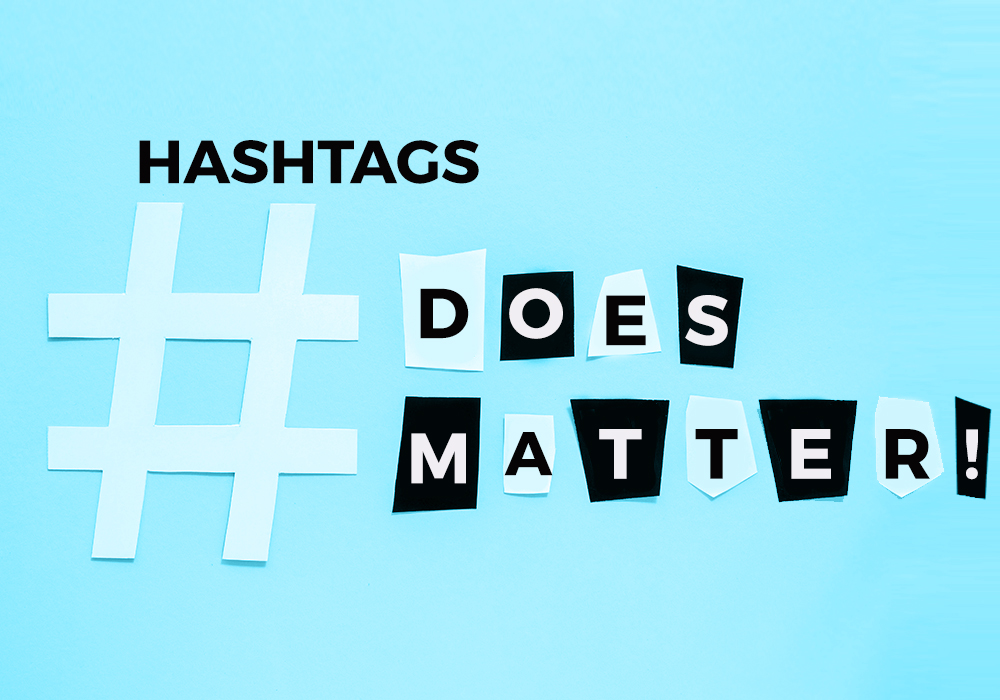It was in the summer of 2007 when Chris Messina, a web marketing specialist and an avid Twitter user, suggested to their team to use the “pound” or “hash” character to group related tweets. On 23 August 2007, hashtags came into existence & caught on across the platform. Twitter hyperlinked the hashtags making it all the better & easy for the users.

Today, platforms like Facebook, Instagram & YouTube, as well as other digital marketing agencies, use hashtags to organize & classify content & also keep an eye on what is trending among the users.
So What Is A Hashtag?
A hashtag is word or a phrase starting with the symbol ‘#’ (e.g. #CharcoalDrawing) which helps to increase the visibility of your content among online users.
Today, social media marketing companies consider hashtags as crucial to any marketing effort because people not only publish content but also search for relevant content online.
When your content has hashtags, it has greater chances of showing in the results of others’ queries.
Hashtag Basics
In order to master hashtagging and use it effectively, top digital marketing companies do a lot of research, creativity & innovation. Easier said than done, creating hashtags is the fusion of art and science which these digital marketing agencies are master at. For effectively using hashtags, it is vital to mind & practice these hashtag basics:
Research:
Just as keywords are integral to SEO, hashtags are important to enhance your brand’s presence among social media users. They must be able to see the content you are posting. Research the words & phrases that are being used by the users of your brand’s products and/or services.
For instance, An online store for liquor delivery in Hong Kong – frequently uses hashtags like #hkliquor, #alcoholdelivery, #hongkongwhisky & #keepitflowing, the last one being the motto of this famous store.
Brevity:
Short & easy to remember – this should be the driving force behind creation of hashtags for your content. Your hashtag should not be a sentence (certainly not on Twitter!). Try to keep it under 20 characters. #ThisIsNotAGoodHashTagForYou!
Specific:
Make sure your hashtag is not obscure to online users. For instance, to raise the visibility of the products under its ‘fashion’ category, Amazon can use #apparelsonline or #amazonfashion. Evidently, the second hashtag is more specific about both the brand as well as its category. Its clarity will be easily understood by a large user segment.
Quantity & Combination:
Using a number of relevant hashtags in clever combinations. Try to create a mix of broad (e.g. #movietickets) and specific hashtags (e.g. #BookMyShowTickets). Don’t create so many hashtags that users take your post as a spam. There is no ideal number for how many hashtags to be used, though on Instagram 4 to 8 good hashtags for a content are sufficient.
Follow Trends:
To garner maximum visibility for your content, always look for trending hashtags and try to model & embed them to complement your need. Social media marketing companies often use tools to identify trending topics among users or in a geographical area. You don’t want to target users in New Delhi if your business focus is in Mumbai!
#So_Who_Uses_Hashtags?
Any individual or a group of individuals active on an online platform supporting hashtagging, can use hashtags. Posting their content linked with relevant hashtags increases content’s visibility to others on that platform.
For instance, an enthusiastic travel blogger, say Ryan, active on Instagram will use hashtags like #travel, #travelphotos, #travelblog, #exoticplaces etc. along with a couple of more related hashtags.
When another Insta user will look for pictures about travelling, he/she may search for ‘travel photos’ on Insta and Ryan’s pics will show up in results if he has used relevant hashtags.
A company running an online business engages in posting a lot of targeted content. Each content has many relevant and clever hashtags to increase its outreach among both the users and non-users of its brand. It also helps that company to fathom what the users are looking for.
At the moment of writing this article, Instagram is returning 498 million results for the search ‘#travel’ while the hashtag #food is returning 393 million posts!
Such is the power of hashtags to group similar content & indicate how prominent a content is among users.
#Why_Use_Hashtags?
Hashtags improve user engagement with your content by increasing its visibility. In a way, it makes your posts visible in the conversation.
Creating a branded hashtag e.g. #AmazonShopping, augments the promotion of your business and also drives online conversation about it.
They can be used to rapidly drive a social cause to a large number of people in a short time. For example, #EachforEqual and #IWD2020 were used across social media platforms, including LinkedIn, on International Women’s Day.
Using a hashtag contextualizes your content, thereby reducing the number of character/words you may need to type otherwise.
For instance, NASA used hashtags #Apollo50th and #WorldEmojiDay on 17 July 2019 to indicate that NASA was celebrating the anniversary of moon landing and also participating in conversation about emojis.Hashtags are like breadcrumbs for your audience (and others as well) to find you. If you are into posting cocktail recipes on Instagram, some connoisseur may like your posts and you may gain a famous person for a follower!
Driving social media marketing is a humongous task that requires a lot of foresight, calculation & well-thought out experimentation.
If you’re looking for help with social media management, search engine marketing, SEO and other online marketing services, the team of experts at General Data can help you generate more visibility, leads and sales of your products and services.
We specialize in formulating social media strategies, creating accounts and setting up profiles, run successful campaigns, do competitor analysis & draw insights to help your business expand further.
For an exhaustive account of our services, feel free to reach out to us at General Data.
